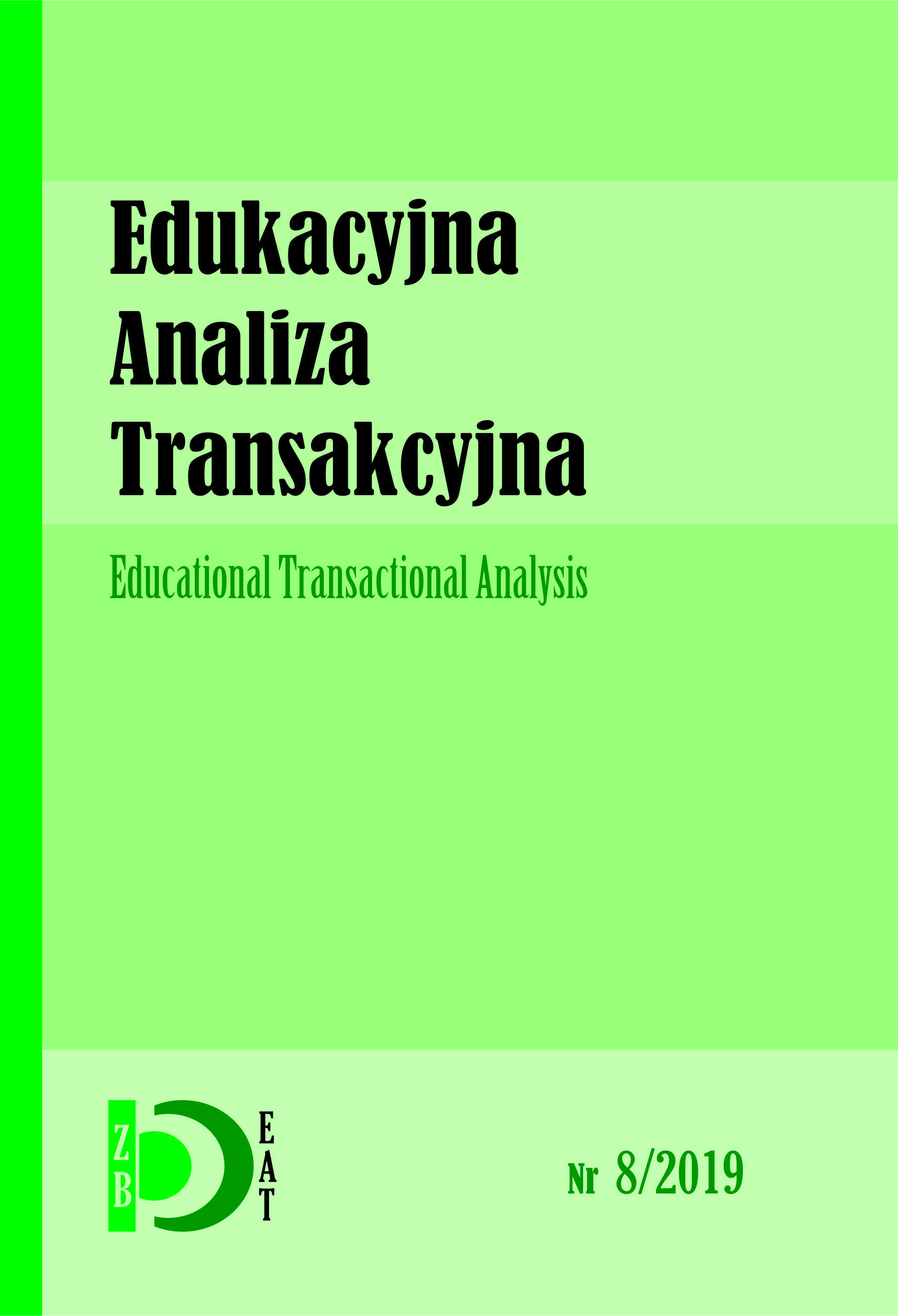Positive transactional analysis
- Authors
-
-
- Keywords:
- transactional analysis, positive psychology, educational transactional analysis
- Abstract
-
From the very beginning, transactional analysis (TA) in its psychotherapeutic dimension has been guided by the same assumptions which form the basis of positive psychology. This fact has been pointed out by a number of authors publishing in TAJ. The implementation of transactional analysis into education and its problems, models and solutions additionally increase the involvement of this concept in contemporary positive psychology. Thanks to educational transactional analysis, the school and the entire educational system can become a place that offers a chance for proper development and the realization of the potential of all agents who take part in education and upbringing (students, teachers, parents).
- Downloads
-
Download data is not yet available.
- Author Biography
- References
-
Allen, J.R, (2006). Oklahoma City Ten Years Later: Positive Psychology, Transactional Analysis, and the Transformation of Trauma from a Terrorist Attack. Transactional Analysis Journal, 2(36), 120–133.
Barrow, G. (2007). Wonderful World, Beautiful People: Reframing Transactional Analysis as Positive Psychology. Transactional Analysis Journal, 3 (37), 206–209.
Colman, A.M. (2009). Słownik psychologiczny. Warszawa: Wydawnictwo Nau- kowe PWN.
Jagieła, J. (2013). Integracja osobowości jako wartość edukacyjna: perspektywa edukacyjnej analizy transakcyjnej. Postawy Edukacji, 6, 119–139.
Jagieła, J. (2017). Znaczenie modelu płynności funkcjonalnej Susannah Temple (FF – functional fluency) dla edukacyjnej analizy transakcyjnej. Edukacyjna Analiza Transakcyjna, 6, 19–48. http://dx.doi.org/10.16926/eat.2017.05.02.
Napper, R. (2009). Positive Psychology and Transactional Analysis. Transactio- nal Analysis Journal, 1 (39), 61–74.
Niemierko, B. (2007). Kształcenie szkolne. Podręcznik skutecznej dydaktyki. Warszawa: Wydawnictwo Akademickie i Profesjonalne.
Okoń, W. (1987). Wprowadzenie do dydaktyki ogólnej. Warszawa: PWN. Rosenhan, D.L., Seligman, E.P. (1994). Psychopatologia. t. I–II. Warszawa: Polskie Towarzystwo Psychologiczne.
Schachner, S. (2016). Models of transactional analysis in educational manage- ment. Edukacyjna Analiza Transakcyjna, 5, 39–45.
Seligman, M. (2003). Authentic happiness. London: Nicholas Brearly. Seligman, M.E.P. (2005). Positive Psychology. Positive Prevention and Positive Therapy. W: C.R. Snyder, S.J. Lopez (red.), Handbook of Positive Psychology (s. 4–9), New York: Oxford University Press.
Sokołowska, E. (2013). Czy analiza transakcyjna może być użyteczna w coachingu? Coaching Review, 1 (4), 41–59.
Steiner, C.M. (1984). Emotional Literacy. Transactional Analysis Journal, 14(3), 162–174.
Steiner, C.M. (1996). Emotional literacy training: The application of transactional analysis to the study of emotions. Transactional Analysis Journal, 26(1), 31–39.
Temple, S. (2004). Building self-awareness. Pobrane 7 stycznia 2019 roku z: https://westtownapps.com/modx2/section-a/
Zaczyński, W.P. (1990). Uczenie się przez przeżywanie. Warszawa: WSiP.
- Downloads
- Published
- 2019-12-31
- Issue
- No. 8 (2019)
- Section
- Reading TAJ
- License
-
AUTHOR'S STATEMENT
I am aware that the Educational Transactional Analysis journal is published under a Creative Commons license - Attribution (https://creativecommons.org/licenses/by/4.0/legalcode).
By submitting the article, I agree to make it available under this license
How to Cite
Similar Articles
- Jarosław Jagieła, dr hab. prof. UJD, Psychopedagogy of cognition and thinking: on the links between cognitive concepts and educational transactional analysis (part 3) , The Educational Transactional Analysis: No. 7 (2018)
- Anna Pierzchała, dr, Edukacyjna analiza transakcyjna a inne nurty pedagogiczne wyrosłe na gruncie koncepcji psychoterapeutycznych , The Educational Transactional Analysis: No. 1 (2012)
- Dorota Pankowska, dr hab., Analiza transakcyjna w edukacji czy edukacyjna analiza transakcyjna? , The Educational Transactional Analysis: No. 1 (2012)
- Bolesław Niemierko, prof. dr hab., Analiza transakcyjna jako metoda diagnostyki edukacyjnej , The Educational Transactional Analysis: No. 2 (2013)
- Adrianna Ciastko, dr, Edukacyjna analiza transakcyjna na XXI Konferencji PTDE , The Educational Transactional Analysis: No. 4 (2015)
- Jarosław Jagieła, Psychopedagogy of meaning and value, that is about the relationship between existential therapy and transactional analysis. (part 6) , The Educational Transactional Analysis: No. 10 (2021)
- Jarosław Jagieła, dr hab.prof. AJD, Psychopedagogy of Learning and Behaviour, or about Connections between Behaviourism and Educational Transactional Analysis (Part 2) , The Educational Transactional Analysis: No. 6 (2017)
- Jarosław Jagieła, Psychopedagogy of integration and authenticity: on the relationship between Gestalt therapy and Gestalt pedagogy and educational transactional analysis (part 5) , The Educational Transactional Analysis: No. 9 (2020)
- Karol Motyl, Let's work or play game! The teachers' lounge in the light of transactional analysis theory , The Educational Transactional Analysis: No. 14 (2025)
- Jarosław Jagieła, Cross-cultural transactional analysis , The Educational Transactional Analysis: No. 9 (2020)
You may also start an advanced similarity search for this article.
Most read articles by the same author(s)
- Jarosław Jagieła, Psychopedagogy of self-fulfilment and autonomy: on the links between humanistic concepts and educational transactional analysis (part 4) , The Educational Transactional Analysis: No. 8 (2019)
- Jarosław Jagieła, dr hab. prof. UJD, Psychopedagogy of cognition and thinking: on the links between cognitive concepts and educational transactional analysis (part 3) , The Educational Transactional Analysis: No. 7 (2018)
- Jarosław Jagieła, dr hab.prof. AJD, Bert Hellinger's Systemic Family Constellation Method from the Perspective of Transactional Analysis , The Educational Transactional Analysis: No. 6 (2017)
- Jarosław Jagieła, dr hab.prof. AJD, Psychopedagogy of Learning and Behaviour, or about Connections between Behaviourism and Educational Transactional Analysis (Part 2) , The Educational Transactional Analysis: No. 6 (2017)
- Jarosław Jagieła, dr hab. prof. AJD, [rec.] Julie Hay, Analiza transakcyjna dla trenerów , The Educational Transactional Analysis: No. 1 (2012)
- Jarosław Jagieła, dr hab.prof. AJD, Significance of Susannah Temple’s Functional Fluency Model for Educational Transactional Analysis , The Educational Transactional Analysis: No. 6 (2017)
- Jarosław Jagieła, dr hab.prof. AJD, Zbigniew Łęski, dr, Pro memoria. Profesor Władysław Piotr Zaczyński (1930–2017) , The Educational Transactional Analysis: No. 6 (2017)
- Jarosław Jagieła, dr hab.prof. AJD, Psychopedagogy of the unconscious and insight (part 1) , The Educational Transactional Analysis: No. 5 (2016)
- Dorota Gębuś, dr, Jarosław Jagieła, dr hab.prof. AJD, Name giving – the beginning of the biography and the script , The Educational Transactional Analysis: No. 5 (2016)
- Jarosław Jagieła, Psychopedagogy of integration and authenticity: on the relationship between Gestalt therapy and Gestalt pedagogy and educational transactional analysis (part 5) , The Educational Transactional Analysis: No. 9 (2020)

